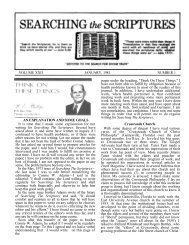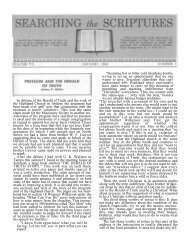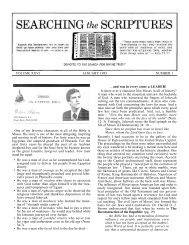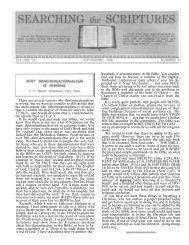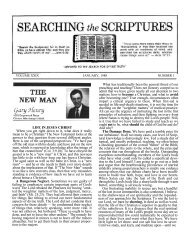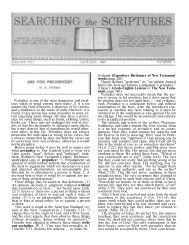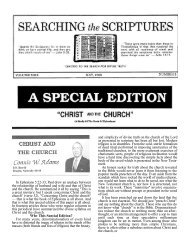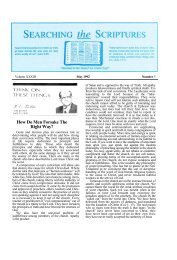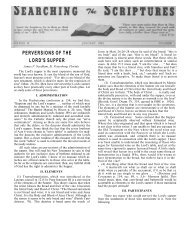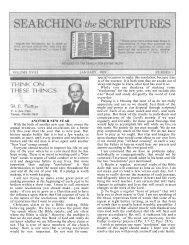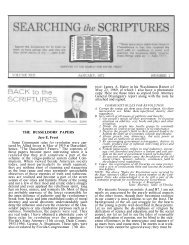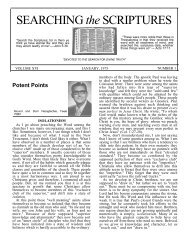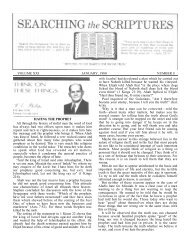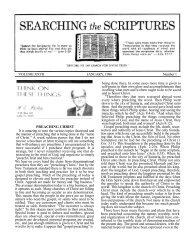Volume 31 – 1990 (PDF) - Searching The Scriptures
Volume 31 – 1990 (PDF) - Searching The Scriptures
Volume 31 – 1990 (PDF) - Searching The Scriptures
Create successful ePaper yourself
Turn your PDF publications into a flip-book with our unique Google optimized e-Paper software.
Page 10<br />
WAS THE KINGDOM POSTPONED?<br />
Premillennialists tell us the kingdom of Old Testament<br />
prophecy is yet future. <strong>The</strong>y say Jesus came to<br />
reign as the Messiah but the Jews rejected Him. He<br />
therefore established the church as a last-minute substitute<br />
(they often call it a "parenthesis"). It will continue<br />
until He comes again, at which time He will<br />
establish His kingdom. Thus the kingdom was postponed.<br />
<strong>The</strong> Bible teaches no such thing. In fact this theory<br />
contradicts the <strong>Scriptures</strong> in at least four ways.<br />
First, predictions with a time element cannot be<br />
postponed. If I predict that a certain football team will<br />
win the Super Bowl, but do not say when, then whenever<br />
they win my prediction will be fulfilled. But if I specify<br />
<strong>1990</strong> as the year, and my team does not win it until 1995,<br />
I cannot say my prediction was postponed; I must admit<br />
that it was false.<br />
So it is with Bible prophecy. When Daniel put a time<br />
element on the establishment of God's kingdom—in the<br />
days of the Roman kings (Dan. 2: 44) — that eliminated<br />
every other time, before and after. Either his prediction<br />
came to pass as stated, or he must be rejected as a false<br />
prophet (Dt. 18: 22). Premillennialists sometimes try to<br />
get around this by saying Daniel was referring to a<br />
"revived" Roman empire. Not so. <strong>The</strong> four parts of<br />
Nebuchadnezzar's image were four successive world<br />
empires. Besides, if Daniel's prophecy refers to a revived<br />
Roman empire, why did Jesus try to establish the<br />
kingdom in the historic Roman empire? Did the Son of<br />
God not understand the prophecy He was trying to<br />
fulfill?<br />
Second, the Bible tells us that the church was part of<br />
God's eternal plan, not an afterthought. Paul was given<br />
grace to preach the gospel "in order that the manifold<br />
wisdom of God might now be made known through the<br />
church to the rulers and the authorities in the heavenly<br />
places. This was in accordance with the eternal purpose<br />
which He carried out in Christ Jesus our Lord" (Eph.<br />
3: 8-11).<br />
Third, God knew beforehand that His Son would be<br />
rejected and put to death. Isaiah predicted that Jesus<br />
would be "despised and rejected of men" (53: 3). He went<br />
on in the same chapter to give a remarkably accurate<br />
picture of Jesus' death. Earlier the Psalmist had referred<br />
to Jesus as "the stone which the builders rejected"<br />
(118: 22). One of Peter's Pentecost points was that Jesus<br />
was "delivered up by the predetermined plan and foreknowledge<br />
of God" (Acts 2: 23).<br />
Did that rejection require God to postpone His kingdom<br />
plans? Not at all. Consider Psalm 2. In verses 1-3<br />
the nations and kings are taking their stand against<br />
God's anointed. (<strong>The</strong> New Testament says this refers to<br />
Herod, Pilate, the Gentiles, and the Jews' opposition to<br />
Jesus (Acts 4: 25-28)). How does that affect God and His<br />
plans? "He who sits in the heavens laughs, the Lord<br />
scoffs at them. <strong>The</strong>n He will speak to them in His anger<br />
and terrify them in His fury: 'But as for Me, I have<br />
installed my King upon Zion, My holy mountain"<br />
(verses 4-6). Next is the Anointed's testimony of God's<br />
decree: "He said to me, Thou art My Son, today I have<br />
begotten thee. '" That refers to Jesus' resurrection (Acts<br />
13: 33), following which He ascended into heaven where<br />
he was given the nations to rule with a rod of iron (verses<br />
6-9; Rev. 2: 26, 27).<br />
<strong>The</strong> Jews' rejection of Jesus was not an obstacle to<br />
God's plan, it was a key element in its success! "For those<br />
who live in Jerusalem, and their rulers, recognizing<br />
neither Him nor the utterances of the prophets which<br />
are read every Sabbath, fulfilled these by condemning<br />
Him" (Acts 13: 27).<br />
Fourth, the Bible teaches that the kingdom is now in<br />
existence. "For He delivered us from the domain of<br />
darkness, and transferred us to the kingdom of His<br />
beloved Son" (Col. 1: 13). "I John, your brother and<br />
fellow-partaker in the tribulation and kingdom and<br />
perseverance which are in Jesus... " (Rev. 1: 9). <strong>The</strong><br />
kingdom consists of men and women everywhere who<br />
are purchased by Jesus' blood (Rev. 5: 9, 10; 1: 5, 6; cf.<br />
Acts 20: 28). Many other New Testament passages speak<br />
of Jesus sitting on God's throne and reigning (Rev. 3: 21;<br />
Acts 2: 34, 35; 1 Cor. 15: 24-26; Heb. 1: 8).<br />
God's word has come to pass. Jesus now reigns in a<br />
kingdom "not of this world" (Jn. 18: 36). Are you a citizen<br />
in that kingdom?



